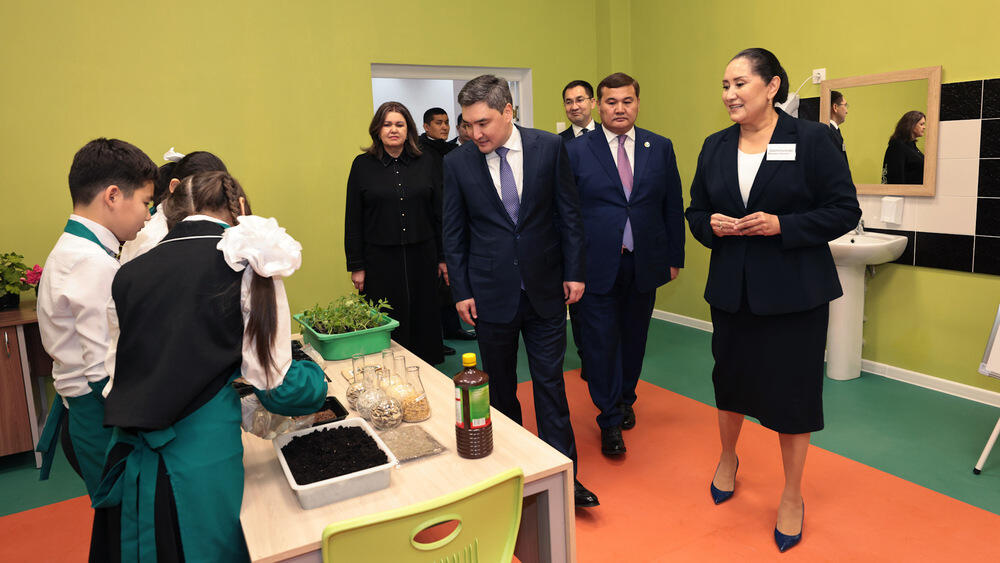
Images | primeminister.kz
Within the framework of his working trip to Kyzylorda region, Prime Minister Olzhas Bektenov checked the implementation of the instructions of the Head of State given in his Address to improve the welfare and quality of life of villagers within the framework of the programme "Auyl Amanaty", diversification of the economy through the development of agro-industrial complex, as well as modernization of social infrastructure facilities to provide residents with quality educational services,
primeminister.kz reports.
In Besaryk village of Syrdarya district Prime Minister got acquainted with successful examples of implementation of "Auyl Amanaty" programme and social responsibility of business. Abai Daulet’ LLP has created a production site, where 13 business initiatives of villagers for 318.2 million tenge have been implemented. Shops for production of semi-finished products, plastic utensils, wood products, textile, confectionery products, soap, etc. have been opened. Olzhas Bektenov familiarised himself with the line of products manufactured by villagers.
For wide dissemination of positive experience the work on opening of similar business incubators in at least 3-4 villages of each district of the region is underway.
In total in Kyzylorda region in the framework of the programme ‘Auyl Amanaty’ this year implemented 575 projects in the manufacturing industry, livestock, crop production and other promising areas with the creation of 610 jobs.
On the example of the plant "Kaz Fries" the head of the Government was presented measures to unlock the potential in the field of deep processing of agricultural products. The capacity of the enterprise is up to 150 kg of fries per hour, the finished products are frozen and sold in the domestic market. Director of "Abai-Daulet" LLP Murat Sarsenbaev informed about plans to further expand the production capacity of the multi-profile company engaged in crop production, poultry farming, livestock breeding and production of construction products.
It is important to note that the partnership makes a great contribution to the development of the village. For these purposes, the company has allocated more than 1.5 billion tenge since 2018. The funds are used for landscaping, gardening, repair of social facilities: a school for 360 places, a kindergarten for 120 places and a doctor's outpatient clinic. The House of Culture for 150 people was overhauled this year due to sponsor support. The concept ‘Adal adam’ initiated by the President is being implemented here, aimed at educating young people in the spirit of patriotism, spirituality and morality. Children's art groups have been opened, and a musical creative group has been set up. In addition, a podcast studio has been set up in the cultural centre "Adal Adam", where topical issues of rural business development are discussed live, and viewers are introduced to the products made in local workshops.
Prime Minister emphasised the importance of the contribution of business in improving the quality of life in rural areas.
Development of the village, stimulation of productive employment, creation of quality social infrastructure are among the priority tasks of the Government. In this direction we fully support all initiatives of entrepreneurs. If each Kazakhstani village will have responsible support from those who build business on this land, then the quality of life of the population will improve more dynamically," Olzhas Bektenov noted and emphasised the need for further scaling of the experience of development of Besaryk village.
In Kyzylorda Prime Minister visited the production sites of agro-industrial complex of "Zhan Arai" LLP, where 200 jobs have been created for today. The enterprise is engaged in production of rice, mixed fodder, processing and storage of fruits and vegetables. Two factories are functioning: on production of mixed fodder with capacity of 80 tonnes of production per day and rice processing with capacity of 150 tonnes of groats per day. In addition, there is a vegetable storage capacity of 4 thousand tonnes, which allows to ensure price stability in the off-season for socially important products. The complex's products are sold in Kazakhstan and exported to countries near and far abroad such as Turkey, Iraq, Russia, Uzbekistan, Tajikistan, Azerbaijan, Belarus and others.
In the regional centre Olzhas Bektenov also got acquainted with the measures taken to increase the coverage of children's additional education. The new Palace of Schoolchildren, built at the expense of private investment, was put into operation in October this year. The cost of the project was 2.4 billion tenge. The social facility with a capacity of up to 350 people is provided with new equipment that promotes all-round development of schoolchildren of different ages such as hydroponics, robotics, industrial design, TV studio and others.
The Prime Minister was also informed about the measures taken in Kyzylorda region to transform the system of vocational education and training within the framework of the Year of Working Professions announced by the President. There are 28 colleges in the region, where today more than 20 thousand students are studying, of which about 5 thousand students are trained in working specialities.
In the 2024-2025 academic year, 7 training and production centres have been opened in all districts of the region. About 300 people are covered by short-term vocational training courses. The first centre was opened in 2022 on the basis of the city lyceum school. It produced 164 specialists in such in-demand professions as cook, seamstress, graphic designer and others. The experience is planned to be scaled up.

